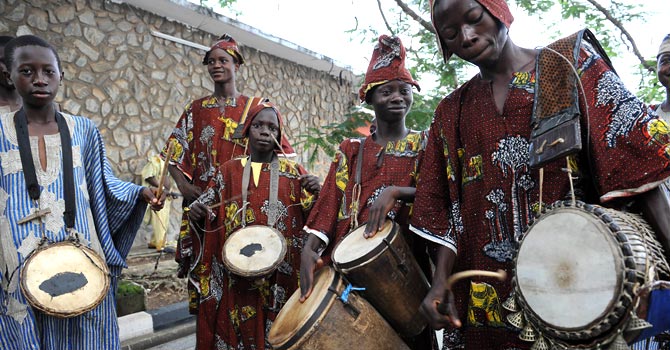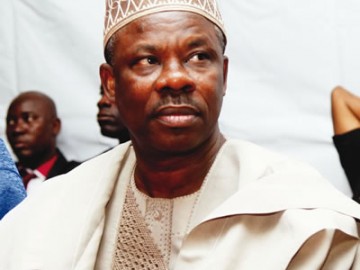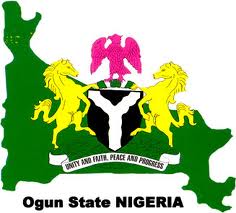African Drum Festival: A Global Convergence For Cultural Reintegration
Raheem Ajayi
The African Drum Festival is fast evolving into a borderless epicentre of cultural renaissance for Africans and the black race in general. The third edition of the annual event held in Abeokuta, Ogun State capital from 19th to 21st April, 2018 brought together impressive assemblage of cultural icons, groups and artistes and entertainers across the African Continents as well as the Diaspora. The 8,000 sitting arena and overflows of June 12 Cultural Centre, Kuto, Abeokuta were filled to capacity while hundreds of cultural enthusiasts glued to giant screens outside the main venue. As expected, the three day event revolved around celebration of the beauties of African Drums. The cultural show-piece featured diverse genre of cultural exhibitions which conveyed the artistic uniqueness of the traditions of African societies.
In the ancient days, Africans deployed drums for the purposes of communication. Sounds of the drums were the wireless purveyor between senders and receivers of messages in the same pattern the telephone invention has evolved over the years. The drum conveys messages to people from one location to the other through variegated sounds from which the interpretation of intended messages are decoded. It is precisely for the expression of the inimitability of the African Drum that messages transmitted through the medium of its sounds are compelling but often codified and therefore unfathomable to the uninitiated! The handling of the African Drum in itself requires depth of artistic competence. The accoutrements of the ‘Talking Drum’ for instance are akin to the encryption that is a dominant element of modern day ICT.
The history of the evolution of information and communication technology would therefore be incomplete without exploring the place of the African drums in traditional setting of messaging and interaction. The African “talking drums” reflect the pitch patterns of transmitting messages across boundaries. The sounds of the “talking drums” are laced with adages, praise-songs and dirges which were understood by traditional African people. The uniqueness of the multi-rhythm nature of African drums distinguishes it from any other drum that is not of African origin. Precisely why African drums produce different sounds suitable for various occasions. In the African setting, there are specific drums that convey the moods of war, peace, celebrations, mourning, marriages, royalty and worships.
It is a well known fact that African drums and the exceptionality of their sounds have found their ways into different continents over the centuries; penetrating cultures through migration and other forms of human interactions including the horrendous expedition of the slave trades. To be precise, the evolution of Afro-Caribbean rhythms has a long history which dates back to centuries of human interactions. It is a widely held belief that romanticization with African traditions by descendants of the Iberian Peninsula featured the culture of drumming with a history that probably predate the slave trades. In spite of the long years of cultural influxes however, the essentials of the African drums and the vitality of the sounds rather than mere aesthetics have struggled to retain exceptionality and the defining genres.
Although drums of the African descent have become popular amongst artistes from other parts of the World, parts of the uniqueness have been reduced by banality to the extent that poly-rhythms rather than multi-rhythms nature of the traditional African drum setting appear to be growing with unassailable hype. Indeed, Nobel Laureate, Professor Wole Soyinka, a cultural icon of note who was a special consultant to the third edition of African Drum Festival, noted that drums that are originally African are now made to produce sounds that lack the “African pulsation”. It should be emphasised that it was in the quest to correctly situate the place of the African Drum as part of the larger agenda of cultural renaissance that the initiator and promoter of the annual event and the Governor of Ogun State, Senator Ibikunle Amosun; CON, FCA has remained unflinchingly committed to the ideals of the annual event. It would not amount to exaggeration to assert that celebrating the diverse unity of the black race through a global convergence around the essence and pride of the African Drum is a no doubt a fitting contribution to the quest for cultural reintegration. Happily, the festival has not only lived up to its billings but has surpassed expectations in enhancing the prospects of uniting Africans at home and in the Diaspora with their heritage which is rooted in the versatility of the drums as tools of socio-cultural engagements.
No fewer than 14 countries participated in the third edition of the festival which featured over 70 groups across the world including groups from the Caribbean. Cultural artists from 24 states of the 36 states in Nigeria competed for honour at the events with Kwara State emerging first while Enugu state and the host state Ogun emerged in second and third positions respectively. Again, it is imperative to assert that a frontier for promoting and preserving the essentials of African Culture is converging in the annual events of the African Drum Festival. As noted by Ogun State Commissioner for Culture and Tourism, Rt. Hon. Muyiwa Oladipo, exploration of the relevance of the drums to the African culture was bound to have direct and far-reaching impacts in reawakening consciousness about the values ingrained in African culture and traditions.
One of the highlights of the festival featured drummers from all over Africa who came together on stage to blend the rhythms of the various drums and the artistic display to the admiration of the audience. The coming together of the artistes who were meeting for the first time to produce harmonious sounds with the display of their drums to convey messages and entertainment bore huge testimony to the beauties the drums bequeath to the African culture. Thus if the pledge by Nigeria’s Minister of Information and Culture, Alhaji Lai Mohammed, who represented President Muhammadu Buhari that African Drum Festival has earned a place in the Country’s Cultural Calendar is to be taken seriously, we can only be assured that the future of cultural reintegration at the global stage looks promising. And maybe, the unity in the rhythm of the drums holds the key to an enduring convergence for the renaissance of African culture.
Raheem Ajayi, Senior Special Assistant to Ogun State Governor on Public Affairs, wrote from Abeokuta.



